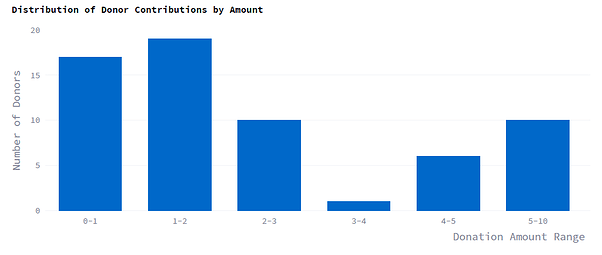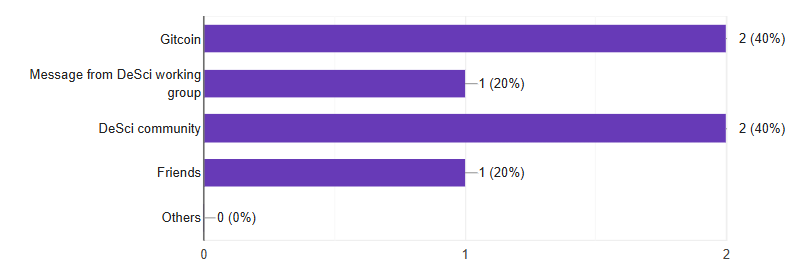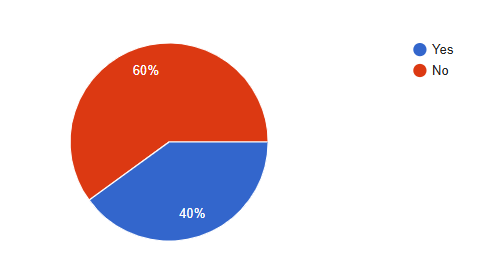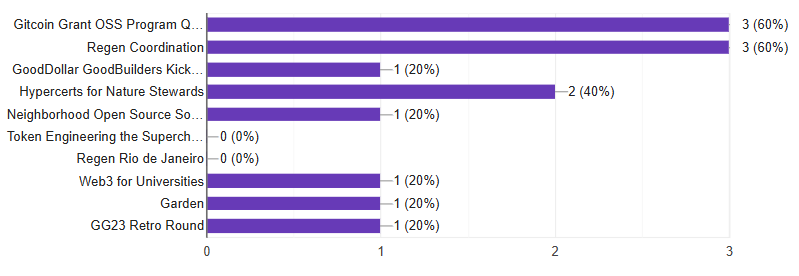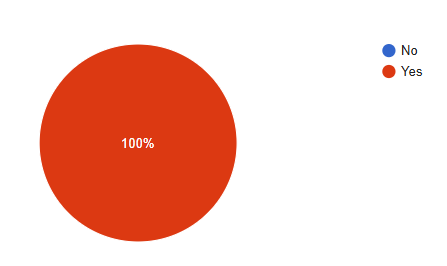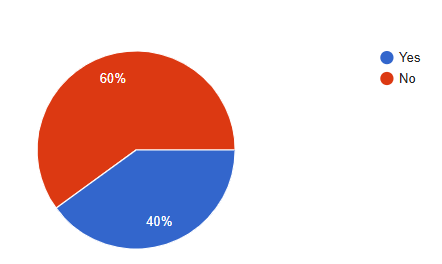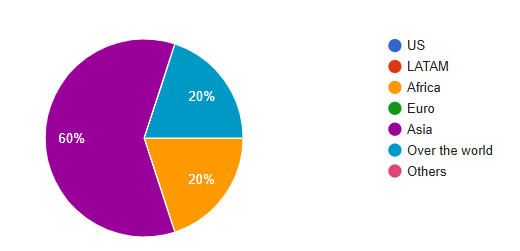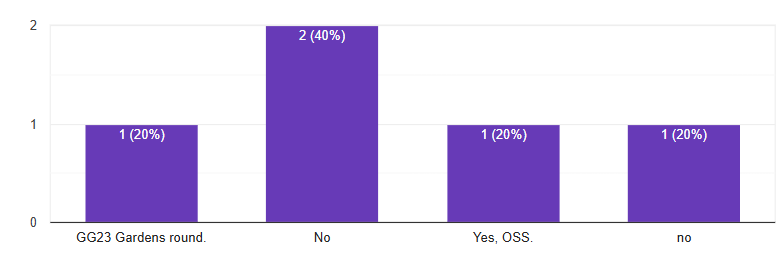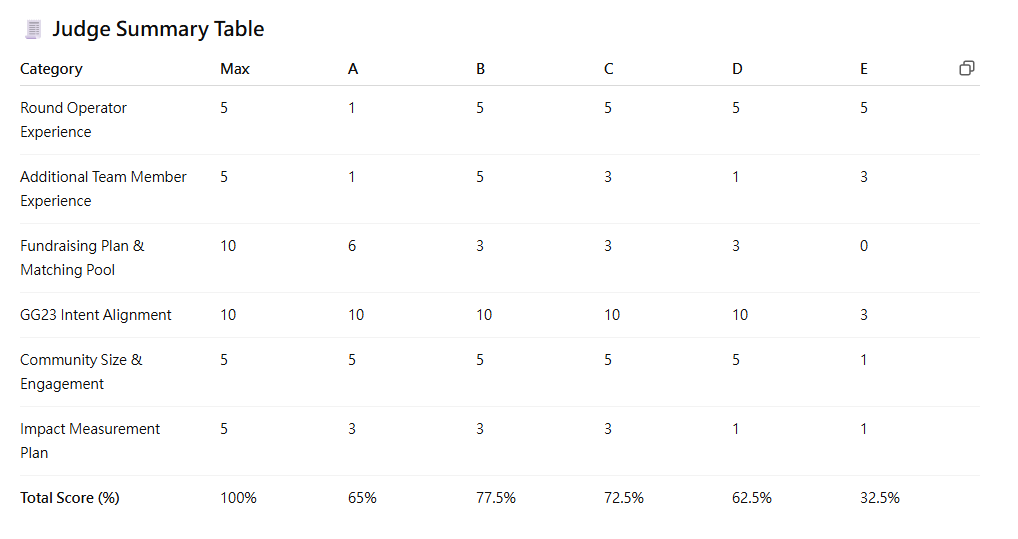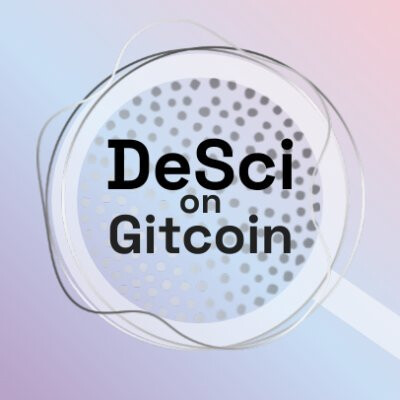GG23 DeSci Community Round report
Part 1: Round Description and Output
DeSci (Decentralized Science) envisions a fair and equitable ecosystem for funding, creating, reviewing, crediting, storing, and disseminating scientific knowledge. The core idea is simple: transparency and decentralization lead to collaboration and progress in academia and beyond.
The first DeSci round was held during GR15 in September 2022.
(Ref: Enabling DeSci: Gitcoin’s Role in Transforming Scientific Funding)
GG23 DeSci Community round was the 5th official DeSci round on Gitcoin, organized with the support of the DeSci round ops. (Ref: Single Source Of Truth (SSOT) for Gitcoin Grant 23 DeSci Community Round)
We distributed $5,000 to 21 projects (Table I), all aimed at advancing the cause of decentralized science (DeSci). It started on Mar 17, 2025, and lasted until April 16, 2025.
Grantees fell in the following categories:
- Data in Healthcare
- Education and Community
- Funding & IP
- Infrastructure (for infrastructure, at least 3 months contribution in DeSci)
- Physical or digital product related to DeSci
- Publishing & Research
DeSci Round Ops (Twitter)
DeSci Round Telegram group (Link)
Round Setting
- Chain: Celo
- Matching Fund Pool: $5,000 USDGLO
- Matching : 5%
- Passport Defense Selected: Passport Model Based Detection System
- Percent Connection-Oriented Cluster Matching: 0.5
- Funding Mechanism: Quadratic Funding
Ref:
GG23 DeSci Community Round application & review on Grantship
Crowdfunding & Distribution Strategy
To ensure equitable support and to avoid concentration of funds among a few high-profile projects, this round implemented a 5% cap on matching funds per project. This design decision successfully encouraged a broader distribution of funds across the DeSci ecosystem.
As a result:
-
Most grantees received around $250 in matching funds.
-
No project disproportionately dominated the pool.
-
The matching pool was more evenly spread across projects with active grassroots community support.
-
Total Projects Applied: 31
-
Applications Accepted: 21
-
Estimated Donations Received: $801.80, 16% of the matching pool ($5,000)
-
Unique Contributors: 80
-
Total Contributions: 274
-
Average Donor Contribution: $5.13 (exclude the suspect sybil attack donation)
-
Median Donor Contribution: $1.05
Table I GG23 DeSci community round matching fund distribution
*Gitcoin Grants stack is closed on 31 May 2025. (Ref)
Part 2: Implementation, Tools and Promotional Events
Implementation & Tools
Impact Measurement with KarmaGAP
Given the diversity of DeSci projects and topics, it’s often difficult to evaluate outcomes or conduct deep, domain-specific analysis using traditional reporting formats. A more systematic and accessible method to track project milestones and ecosystem impact is urgently needed — both for community reflection and for attracting future sponsors and donors.
 KarmaGAP Integration
KarmaGAP Integration
To address this, we required all GG23 grantees to submit at least three completed milestones on KarmaGAP, a community analytics and impact tracking tool powered by on-chain credentials and AI support.
-
We have established a “DeSci-on-Gitcoin” community on KarmaGAP, now comprising:
-
142 total DeSci projects
-
Spanning 4 DeSci Community Rounds since 2023
-
27 projects (19%) with validated milestone entries
-
This marks a solid beginning in onboarding DeSci builders to document their achievements in a verifiable and accessible way.
 KarmaGAP AI Support
KarmaGAP AI Support
We plan to make KarmaGAP milestone tracking mandatory in future DeSci rounds. With more structured data across projects, the DeSci-on-Gitcoin community page will serve as a single-source platform to:
-
Track ecosystem-wide progress
-
Understand the distribution of support
-
Surface standout achievements across funding rounds
KarmaGAP’s AI tools provide ecosystem-wide insight, helping us evaluate both GG23’s impact on individual projects and broader DeSci movement trends. Feel free to try this AI.
![]() Explore DeSci Milestones via KarmaGAP AI
Explore DeSci Milestones via KarmaGAP AI
On-Chain Recognition with Hypercerts
To acknowledge the contributions of our working group members, we minted a Hypercert representing their efforts in organizing the GG23 DeSci Community Round:
![]() View Hypercert
View Hypercert
After a successful trial and collaboration with the Hypercerts team, we used the multi-wallet minting feature to issue this credential to all core contributors. This Hypercert acts as an on-chain, verifiable record of participation in the round and is a step toward transparent, decentralized reputation-building within the DeSci ecosystem.
With the sunsetting of Gitcoin Grants Stack (announcement), it is more important than ever to establish persistent and composable tools for recording impact. Hypercerts offer a robust infrastructure to track and verify contributions independent of any single platform.
We will evaluate the feasibility of issuing Hypercerts to all GG23 DeSci round grantees as a way to formally recognize their participation and contributions. This could help build interoperable impact credentials across the broader DeSci and public goods ecosystems, enhancing grantee visibility and support in future rounds.
Promotional Events
To drive awareness and engagement during the round, the DeSci Working Group hosted a series of community events:
-
5 AMA sessions with our sponsors: Greenpill Network, KarmaGAP, $Scihub, Glo Dollar and Celo
Total View: 7243
Total Attendance: 425 -
1-hour live Q&A to support grantee applicants during the application window
-
2 AMAs during the donation period to give grantees a platform to present their achievements and connect with donors. (AMA1 & AMA2)
-
A dedicated 30-minute segment in the Let’s Grow Live daily stream, introducing DeSci to a broader GG23 audience
-
The summary of all 21 DeSci projects through our Twitter call for donation
Part 3: Round Feedback summary & Challenge for GG23
Feedback from Stewards, working group and community:
Maria’s feedback (@GoretiFreitas):
The Gitcoin GG23 DeSci working group has made significant strides in allowing projects to flourish by leveraging crowdfunding mechanisms, which enabled the participation of a diverse range of initiatives. This approach successfully promoted community-driven support, offering projects the chance to secure funding and gain visibility.
However, there were some challenges that emerged. One key issue was the tendency for projects to vote for themselves in an attempt to maximize their share of the matching pool. This behavior undermined the competitive nature of the funding process. Additionally, the unexpected flattening of funds funneled from the pool, as a result of the 5% cap we established, limited the differentiation among projects and reduced the incentive for those that made significant campaign efforts. This capped distribution approach, while ensuring equity, unfortunately led to diminished competition and may have prevented standout projects from receiving the recognition and support they deserved.
Brenda’s feedback:
One of the most important aspects, as a contributor reviewing projects, is that a thorough job was done in auditing and approving the projects selected to participate in the GG23 round. This lays a strong foundation for refining and improving the project review process in future rounds. I also want to highlight the work of the DeSci Working Group team regarding the organization, efficiency, and effectiveness with which this round was carried out.
On another note, the fact that this round was hosted on the Celo blockchain added an extra challenge, as participating projects had to learn how to use a new blockchain with its own specific parameters. The same applied to donors. However, I view this as a positive step toward broader Web3 inclusion, and I personally did not encounter any major issues while using it.
Lastly, it’s important to acknowledge and thank those who helped make this round possible, allowing science-focused projects to receive small-scale financial support in a decentralized manner.
Swift Evo’s feedback (@Swiftevo):
Strengthening Working Group Sustainability
Gitcoin Grant 23 DeSci community round’s working group was a mix of 50% returning members from GG21 and 50% new contributors. Onboarding the new members was smooth and successful, but a key challenge remains:
The bounty for working group contributors is far too low, relying only on small donations and matching funds from the DeSci community round itself.
-
In GG23, less than $300 was distributed among a team of 9 people, all of whom worked for over three months to plan and execute the round.
-
In GG21, the situation was similar: around $200 distributed among 12 contributors over a similar period.
These contributors handled outreach, coordination, partnership building, applicant support, and round design—all vital to the round’s success. Without fair compensation, it’s unsustainable to retain or grow the working group and DeSci community round.
In future rounds, we might consider to reserve at least 10% of total sponsorship funds or secure a minimum $1,000 bounty pool to support working group sustainability.
Funding Allocation: QF Needs Complementary Mechanisms
Quadratic funding (QF) remains a strong base for fair distribution, but it doesn’t always reflect deeper project impact or community insights. Over the last two rounds, we’ve explored enhancements:
-
COCM (Community Open Curation Mechanism) introduced in GG21
-
KarmaGAP with 3 impact milestone tracking implemented in GG23
This hybrid model helps balance public support with transparent, structured evaluations. We will continue refining these mechanisms to better reflect real-world value creation in the DeSci space.
Multichain & Multi-platform Strategy
GG23’s strategic alignment with Celo and USDGLO created valuable chain-level collaboration and introduced stablecoin-based public goods funding.
To future-proof the DeSci ecosystem, we propose expanding beyond Gitcoin and exploring other platforms or possibilities, which opens new pathways for funding diversity, interoperability, and wider participation across the Web3 ecosystem.
Scott’s feedback (@Scottitepu ) :
The GG23 round marked a meaningful shift, with thoughtful steps taken to ensure fairness from the use of Karma Gap in verification to the decision to host on Celo, which broadened participation. While the structure encouraged a more level playing field, the funding limitations were a clear constraint. Moving forward, it’s important we begin laying the groundwork for more sustainable support systems well ahead of the next round so that promising projects aren’t held back by limited resource gaps.
Overall, it was a great experience and newer learning frontier as well.
Community Survey from Grantess by Google form
- How do you know about GG23 DeSci round?
- This is the first time you donate in DeSci round?
- Beside DeSci round, do you also donate the following QF round during GG23?
- Do you have any feedback to DeSci round working group for a better arrangement in the next DeSci round? including fund raising, steward application, grantee application, criteria, e.g. KarmaGAP, reviewing and funding allocation.
Kudos to the team for the following key improvements: a hard deadline for project applications; a proof-of-merit of Karma GAP for eligibility. I’d suggest to keep them in place for the next rounds, where, hopefully, the matching pool will be larger. Thank you!
a lot of the processes are still evolving in my view. it’s very helpful to be part of the telegram communities, but it’s not easy to keep track of information there. perhaps we could leverage new platforms like charmverse, commonground etc. to create a simple handbook for newcomers.
- Do you apply DeSci round as grantee?
- this is the first time you submit your project in DeSci round?
- Which geographic location does your project mainly focus on?
- Did you also apply others GG23 round as grantee? If Yes, which round did you apply?
Part 4: Lessons Learned and Improvement
The lessons learned from this experience emphasize the importance of balancing inclusivity with the need to ensure the integrity of the crowdfunding process. While inclusivity is crucial for fostering innovation and supporting a diverse set of projects, there must also be mechanisms in place to safeguard against manipulative behaviors, such as Sybil attacks, and to ensure that projects are genuinely active and committed to their goals.
A reputation-based system
One key improvement would be to track the history and reputation of participating projects. By combining mechanisms like KarmaGap and Hypercerts, which could track updates, contributions, and interactions, we could ensure that projects with a history of positive engagement are prioritized. Projects with suspicious histories or those involved in unethical activities like Sybil attacks should be blocked from participation to maintain the integrity of the system.
Additionally, implementing a reputation-based system (such as open rank could provide incentives for projects to stay engaged and regularly update their progress. This would encourage transparency and accountability, allowing the community to trust that the projects they are supporting are legitimate and dedicated to their cause. The lesson here is that while inclusion is important, establishing clear guidelines and tracking mechanisms for accountability will help maintain fairness and ensure that those who truly contribute and innovate are given the resources they deserve.
Reverting trigger mechanism
So, to address the challenges identified, we propose adding a “Reverting trigger” mechanism to the process. This would involve funneling funds donated by projects involved in self-donation or Sybil attacks to the matching pool, rather than allowing those funds to be returned to the projects. By doing so, we can create a strong deterrent to avoid manipulative behaviors and ensure that funds are distributed fairly among legitimate projects.
This mechanism would serve as a deterrent against unethical actions, as projects engaging in these behaviors would no longer be able to benefit from suspicious donations. Instead, the funds would be redistributed to support other deserving projects, preserving the fairness and integrity of the crowdfunding process. Additionally, this would foster a more competitive and transparent environment, where projects are motivated to engage authentically and contribute meaningfully to the ecosystem.
A dynamic range of matching cap
While the 5% matching cap per project helped ensure equitable distribution in GG23, we also observed some limitations:
-
The cap was too flat to reflect meaningful differences in small-donor engagement between projects.
-
Projects that successfully mobilized more unique contributors were not proportionally rewarded due to the hard ceiling.
To better balance fairness and incentive:
-
Adjust the cap to a dynamic range of 5%–10%, allowing projects with stronger grassroots support to receive proportionally more matching without overwhelming the pool.
-
This approach would:
-
Preserve the equity goal of preventing dominance,
-
While also incentivizing broader donor outreach,
-
And better capturing the spirit of QF—amplifying the impact of many small donations.
-
By fine-tuning the cap, we can continue fostering diversity among grantees while enhancing the effectiveness of quadratic funding in rewarding genuine community backing.
Grantship summary and feedback
We appreciate using GrantShip’s transparent scoring system, which has guided us in improving future rounds. Positive judge feedback and visibility into scoring helped us identify strengths and areas for enhancement. We hope this process continues to support and validate DeSci Community Rounds in the future.
(GG23 DeSci community round application on Grantships.)
Five Judges scoring summary
 Key Feedback Insights
Key Feedback Insights
 Strengths Highlighted Across Judges
Strengths Highlighted Across Judges
- Strong mission alignment with Gitcoin’s goals, especially around scientific collaboration and open research.
- Active community with >400 Telegram members. (DeSci on Gitcoin Telegram group)
- Experienced team (notably Round Operators), particularly noted by Judges B, C, and E.
- Innovative tools like KarmaGAP and Gitcoin Passport were recognized, though not deeply evaluated.
 Areas for Improvement
Areas for Improvement
- Matching Pool Size & Fundraising Plan
- All judges (except A) flagged the matching pool as too small for 30–40 grantees.
- Judge E gave 0 points, citing “very minimal co-matching” and unclear fundraising ratio.
- Next step: Aim for a larger pool or scale grantee number to match available funds. Consider confirming a reserve % for working group bounties.
- Clarity in Impact Assessment
- Judges A–E rated this area low to medium (1–3 out of 5).
- Main issue: the impact metrics were vague, even with KarmaGAP.
- Next step: Clearly define success metrics (e.g., publication outputs, project milestones, community feedback loops).
- Team Composition Transparency
- Judge D had confusion over who exactly was on the working team.
- Next step: Explicitly list working group members and roles in the grantship application next time.
- Community Size Disagreement
- Judge E rated the community as “25+” despite Telegram having 400+ members.
- Next step: Present the quantifiable, verifiable community metrics in a clearer format.
Part 5: List of Working Group, Stewards, and Coordinators
Working Team
Stewards
Stewards’ Coordinator
Part 6: Sponsors and Partners Acknowledgement
Sponsor
![]() @CeloOrg – A carbon-negative blockchain dedicated to public goods & regenerative finance.
@CeloOrg – A carbon-negative blockchain dedicated to public goods & regenerative finance.
![]() @GloDollar – A stablecoin where every transaction funds public goods.
@GloDollar – A stablecoin where every transaction funds public goods.
![]() @GreenPillNetwork – A community driving regenerative crypto movements.
@GreenPillNetwork – A community driving regenerative crypto movements.
![]() $SciHub – Supporting the rebellion against paywalled knowledge.
$SciHub – Supporting the rebellion against paywalled knowledge.
Your support is making community-driven science funding a reality! ![]()
Partners
DeSci Gitcoin Community
Community-run quadratic funding grant rounds for DeSci
Follow our Twitter
Join our Telegerem group
Support us at GIVETH
Endorse us at KarmaGAP
